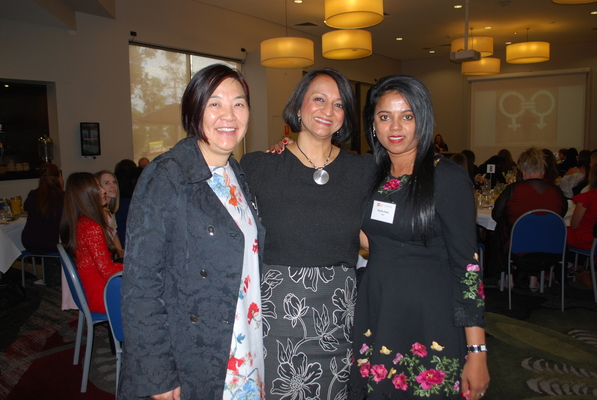By Narelle Coulter
Sadhana Smiles didn’t just break through the glass ceiling on her way to becoming CEO of real estate company Harcourts Victoria. She had to break out of a glass box.
The 2013 Victorian Telstra Business Woman of the Year was guest speaker at an International Women’s Day breakfast hosted by the South East Business Network (SEBN) and the Greater Dandenong Chamber of Commerce on Friday.
“We talk about the glass ceiling, I was born in a glass box,“ she told the largely female audience, which included Minister for Women Gabrielle Williams.
Ms Smiles was referring to her journey from a girl growing up in conservative Fiji in the 1970s (her grandfather had been transported from India as a slave) to her role as a champion of change in the corporate world.
“When I won the Telstra Business Award I looked terrified,“ she said, displaying a photograph of herself taken at the awards ceremony in 2013.
“Like so many other women, I didn’t think I was ready to win it. I thought I hadn’t ticked all the boxes.
“We were given a table at the back of the room, which usually means you haven’t won, so I started enjoying the night drinking copious amounts of Champagne.“
When her name was announced, Ms Smile’s remembers being stunned. Her father, unable to hide his joy, stood up and started Bollywood dancing.
She said women should not be hampered by the voice in their head telling them they are not ready for the next challenge, the next promotion or the next award.
“Find a way to ignore that voice. Be courageous, take that leap of faith. And even if you are not successful, the journey will be worth it.“
Ms Smiles said winning the Telstra award gave her influence and a voice on issues that were important to her – gender equality and workplace diversity.
As a Fijian Indian Australian she is outspoken on the need to increase diversity in Australian workplaces.
“In a country built on immigration, the richness and diversity of our communities is not being represented in corporate Australia or at a government level,“ Ms Smiles said.
“The double glazed glass ceiling is so real for women of ethnic backgrounds. I ask leaders to become hyper aware of cultural diversity in their organisations.
“Often the issue of balance and diversity is outsourced to HR. This is an issue for leaders, it is a business strategy issue.“
Ms Smiles was educated in Fiji and then at Melbourne’s Tintern Girls School.
“My parents sent me to Australia to become a lady and get an education. I had my mind on freedom and boys,“ she said, laughing.
After nearly failing her VCE, Ms Smiles studied hospitality management at TAFE, before marrying her boyfriend of six months because her student visa was about to expire.
She said it wasn’t until she was in her 40s that she set her focus on achieving her career goals.
She is now a great believer in planning and setting goals, both personal and professional.
Each year Ms Smiles has dinner with a close girlfriend, where they review their goals from the past year and set new ones for the year ahead.
She sticks her new goals on her shower wall, “ so I see them every day“.
“Writing it down keeps you focussed on the direction you want your life to lead.“
Ms Smiles has also been a champion of change when it comes to domestic violence and women’s safety.
After the brutal murder of Jill Meagher, Ms Smiles created the Walk A Mile initiative whereby Harcourt’s staff, both male and female, strap on high heels and march to raise awareness about domestic violence and raise money for White Ribbon initiatives in schools.
To date, Walk A Mile has raised half a million dollars and helped White Ribbon get its message into 300 schools.
“If I am proud of anything I have achieved then it is this. It is the legacy I leave behind. I can’t see our organisation every dropping it.“
Dandenong MP Gabrielle Williams said she won’t be satisfied that she has succeed in her job until the statistics around domestic violence improve.
“Violence against women is still the leading cause of death and disability for women aged 15 to 44,“ Ms Williams said.
“We need to disrupt the culture that allows it to happen.
“When women are equal and valued, the whole community has a lot to gain.“







